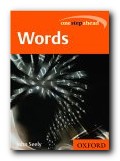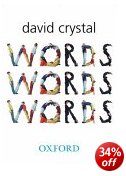beginner’s guide to language skills
Did you know that there are between one and two million words in the English Language. It’s the biggest stockpile in any language, mainly because English has been forged from many other languages – including Latin, Greek, Anglo-Saxon, French and German. Most people know between 25,000—75,000 words, and John Seely’s advice in this lively and accessible guide is that we should become aware of the distinctions between words. Word power is not just a case of learning more and more words, but using them with more care. He shows how words should be selected according to the situation in which they are going to be used. For instance, there is no point using specialist jargon if you are writing for a general audience.
 He gives advice on using a dictionary, and he offers a good account of what information dictionaries contain, and how to choose one to suit your purposes. There’s an interesting chapter on judging your audience and choosing the appropriate vocabulary for your purpose in writing. This deals with the connotations, the range and tone of words, ranging from formal, informal, and jargon, to slang and even taboo words.
He gives advice on using a dictionary, and he offers a good account of what information dictionaries contain, and how to choose one to suit your purposes. There’s an interesting chapter on judging your audience and choosing the appropriate vocabulary for your purpose in writing. This deals with the connotations, the range and tone of words, ranging from formal, informal, and jargon, to slang and even taboo words.
He offers a brief account of the history of the English language, showing how it has been and continues to be built from words borrowed from other languages. It’s also particularly good for coining new terms from existing words – such as cybercafe and velcroid.
The second part of the book gives a humane collection of information about word classes, word structure – nouns, verbs, adjectives, prefixes, suffixes, and so on. This also includes lists of words which are commonly confused, such as adduce/deduce – and he ends with a detailed glossary.
This might all sound rather dry, but I have to say that the more I read on, the more interesting the book became. It’s suitable for anybody who wishes to perform more successfully in the workplace or in studying, and it will tell you all you need to know in order to develop or improve your word building and vocabulary.
© Roy Johnson 2002
John Seely, Words, Oxford: Oxford University Press, 2002, pp.128, ISBN: 0198662823
More on writing skills
More on language
More on grammar
